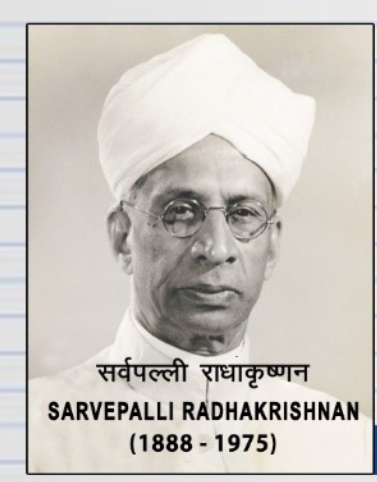Teachers’ Day 2024 | 05 Sep 2024
Why in News?
Recently, India celebrated Teachers' Day on 5th September 2024 marking the birth anniversary of Dr. Sarvepalli Radhakrishnan (1888-1975).
- On this day, the President of India confers the National Teachers’ Award (NTA) to honour teachers and recognise their contributions in empowering and educating society.
What are Key Facts About Dr. Sarvepalli Radhakrishnan?
- Birth: He was born into a Telugu family in Tiruttani town of Tamil Nadu, on 5th September 1888.
- Academic Achievements: He held several prestigious positions, including the King George V Chair at Calcutta University from 1921 to 1932, the second Vice-Chancellor of Andhra University from 1931 to 1936, and the fourth Vice-Chancellor of Banaras Hindu University from 1939 to 1948.
- Moreover, he was Professor of Eastern Religion and Ethics at the University of Oxford from 1936 to 1952.
- Political Career: He became the first Vice President of India (1952-62) and later the second President of India (1962-67).
- Philosopher: He is widely acknowledged in philosophical circles as a “bridge-builder” between India and the West.
- He defended Hinduism against what he perceived as “uninformed Western criticism,” helping to establish a more nuanced understanding of the religion on a global scale.
- Recognition: In 1954, he was awarded the country's highest civilian award, Bharat Ratna.
- In 1931, he was awarded with knighthood by King George V, former King of Britain, for his remarkable academics.
What is the National Teachers’ Award?
- About NTA: It was instituted to celebrate the unique contribution of teachers and to honour them who have improved the quality of education and enriched the lives of students.
- It carries a certificate of merit, a cash award of Rs. 50,000 and a silver medal.
- It is given by the Ministry of Education. In 2024, 82 teachers were selected for NTA.
- Eligibility of Teachers for NTA: School teachers and Heads of Schools working in recognized primary/middle/high/higher secondary schools are eligible for selection. E.g., Schools run by State Govt./UTs Administration, Schools affiliated to CBSE etc.
- Only regular teachers and heads of schools with a minimum ten years of services are eligible.
- Non-Eligibility for NTA: Teacher/Headmaster should not have been involved in providing private tuition.
- Contractual teachers and Shiksha Mitras are not eligible.
- Educational Administrators, Inspectors of Education, and the staff of training Institutes are not eligible for these awards.
- Evaluation Criteria: Teachers are evaluated based on the evaluation matrix which contains two types of criteria for evaluation.
- Objective Criteria: Under this the teachers are awarded marks against each of the objective criteria. It is given the weightage of 10 out of 100.
- Criteria Based on Performance: Under this, teachers are awarded marks on criteria based on performance e.g., initiatives to improve learning outcomes, innovative experiments undertaken etc. These criteria are given the weightage of 90 out of 100.
UPSC Civil Services Examination, Previous Year Questions (PYQs)
Prelims
Q.With reference to the scholars/litterateurs of ancient India, consider the following statements: (2020)
1. Panini is associated with Pushyamitra Shunga
2. Amarasimha is associated with Harshavardhana
3. Kalidasa is associated with Chandra Gupta-II
Which of the statements given above is/are correct?
(a) 1 and 2 only
(b) 2 and 3 only
(c) 3 only
(d) 1, 2 and 3
Ans: (c)
Q.Consider the following statements: (2018)
1. As per the Right to Education (RTE) Act, to be eligible for appointment as a teacher in a State, a person would be required to possess the minimum qualification laid down by the concerned State Council of Teacher Education.
2. As per the RTE Act, for teaching primary classes, a candidate is required to pass a Teacher Eligibility Test conducted in accordance with the National Council of Teacher Education guidelines.
3. In India, more than 90% of teacher education institutions are directly under the State Governments.
Which of the statements given above is/are correct?
(a) 1 and 2
(b) 2 only
(c) 1 and 3
(d) 3 only
Ans: (b)
Q.Who among the following Gandhian followers was a teacher by profession? (2008)
(a) A. N. Sinha
(b) Braj Kishore Prasad
(c) J. B. Kriplani
(d) Rajendra Prasad
Ans: (c)

